A matter of dignity and safety with far reaching consequences
A Toilet and a safe place to wash and change clothes would have to be one of the most fundamental aspects of dignified existence in any settled community. And yet in the world today more than 2.6 billion people do not have this, and many more lack truly safe sanitation, having access only to rudimentary Latrines that pollute their environment
About 2.4 billion people — or roughly one-third of the world's population — still lack access to proper toilets, according to a report published Tuesday by the World Health Organization and UNICEF.
The study warns that progress on sanitation is falling short of the targets outlined in the U.N.'s Millennium Development Goals, even though significant improvements have been made in related areas including access to safe drinking water. Today, only 68% of the world's population has access to proper sanitation facilities, a handful of percentage points short of the goal of 77%. Many of those who lack proper toilets and defecate in the open live in South Asia and sub-Saharan Africa, according to the report.
“Until everyone has access to adequate sanitation facilities, the quality of water supplies will be undermined and too many people will continue to die from waterborne and water-related diseases,” said WHO public-health director Dr. Maria Neira in a statement.
http://time.com/3942630/toilets-who-unicef-report/
It impacts peoples lives deeply
Preventable illness spread by open defecation kills many, especially children. It also affects the schooling of girls especially with the onset of puberty where they may be too embarrassed or insecure at school when dealing with menstruation and bodily changes. Girls dropping out of school early impacts their future lives, their economic potential and therefore lifelong status in the community, and affects the next generation as undereducated mothers leads to higher birthrates, poorer child health and future educational outcomes
Access to properly functioning Toilets are one of the most pressing needs of the 21st century, for the sake of people and the environment
What is needed is a complete package that is affordable, acceptable, useful and robust in its design. Being attractive always helps ;)
“Tiger toilets” – Vermifilter sanitation
The Tiger toilet system is an evolution that can fuse the pour flush toilet, with the composting toilet system, through vermifiltration chambers
https://en.wikipedia.org/wiki/Vermifilter.

Compost worms digest the inputs from the toilet in an aerobic chamber that efficiently converst and cleans waste
Worms consume biosolids and the effluent filters through the compost bed and drains to designed Wastewater gardens for growing mulch, fodder and fibre crops (non food)
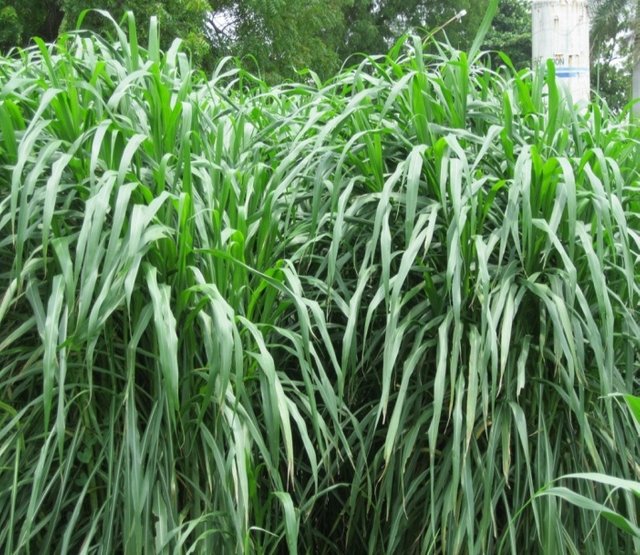
Grasses like Napier grass are excellent at using Wastewater effluent to create forage for animals and carbon inputs for soils as mulch
Vermifiltration methids equal or exceeds the abiity of traditional anaerobic sludge fermentation ( The septic tank) in breaking down solids and destroying pathogens.
The Tiger Toilet is linked to a normal pour flush system, so the user experience is therefore the same as using a septic tank or a pour flush latrine. The waste then enters a tank which contains the worms and a drainage layer. The solids are trapped at the top of the system where the worms consume it, and the liquid is filtered through the drainage layer. Extensive laboratory scale trials found that the worms reduce the solids in the system by above 80%, and the effluent quality is higher than that from a septic tank. An initial prototype has been running at the Centre for Alternative Technology in Wales, UK for over a year.
https://www.usaid.gov/div/portfolio/bvv-tiger
In our evolving system, the nutrients from the effluent are to be recaptured safely in the landscape, without handling, and cycled back into orchards as mulch, where it helps to reduce fossil fuel dependent chemical fertilizer inputs. These are nutrients that would otherwise have contaminated groundwater, rivers and coastal habitats now returned to grow trees.
This Toilet is a prototype and the first in Indonesia, to our knowledge, it’s also the first time we know that ferrocement technology and resusable formwork, taught by BATI, has been used with the vermifiltration system. This opens the possibility for low cost builds in difficult terrain as well as creating self sustaining local employment in the deployment of these toilets to villages and ecotourism areas
For East lombok communities living and farming off the land, this is often their current washroom option.
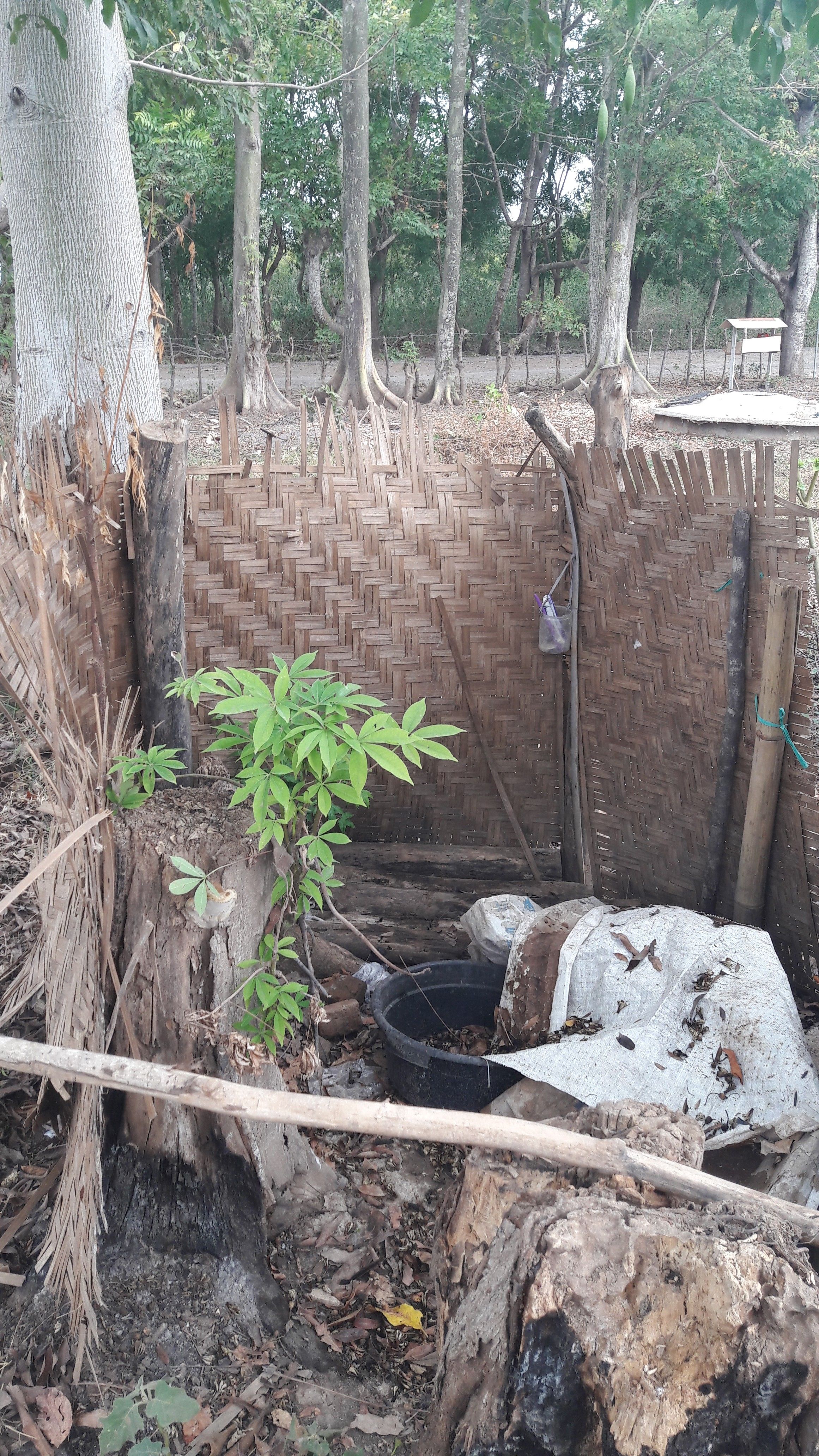
The toilet is, we guess, in the forest in the background. I've been working in this area several years now and i know, when its time, you find a patch of forest or a cornfield. There is no other option available. And then it comes as no surprise that when the rains start it, or during the dusty months, they becomes a seasons of illness when the death rate from all causes spikes. Waterborne and dust borne pathogens thrive where sanitation is poor.
This project is fully funded by

This build is funded by Ecoregions Indonesia, as part of their ongoing support for the people of Sekaroh forest, with a 9 million Indonesian rupiah research and build budget, along with use of Ecoregions staff hours to make and test the prototype. After some months testing we hope to also gather some Steem community support to continue prototype and business model development for job creation.
We hope you follow our progress towards the a workable solution to these problems that is socially acceptable, economically sound and environmetally beneficial.
Creating the formwork
This has been an exciting week creating the formwork for the New Toilet block and building the Toilet block
Pleaseprevious and future installments here
https://steemit.com/permaculture/@reville/evolving-the-tiger-toilet-part-1
https://steemit.com/permaculture/@reville/evolving-the-tiger-toilet-part-3
https://steemit.com/permaculture/@reville/evolving-the-tiger-toilet-part-4
First we cleaned up the Water tank moulds and oiled new plywood for the outer cover.
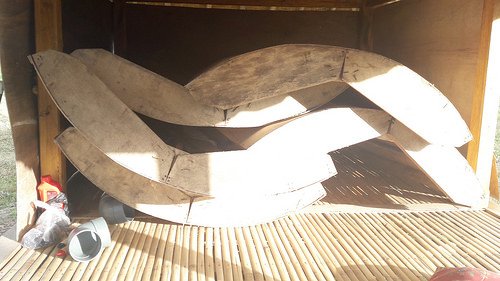
Still good for another 50 Tanks! 4 = 1 Tank
These 5000L tank moulds are remaining from a past project and only require some light maintenance and fresh outer 3mm ply.
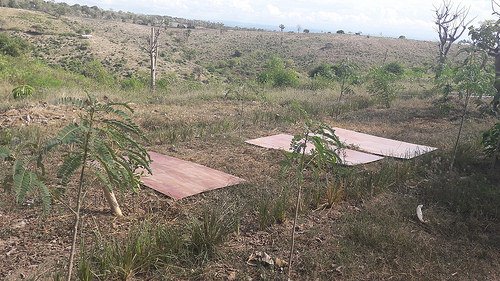
Grease 'em up. New motor oil was used as used oil contains accumulated toxins that we don't need on our staff
Next we constructed the new formwork for the 1.2m diameter x 1.2m high cylinders that will hold the worm filtration chamber.
Formwork was made with plywood and local timber,just like the water tank formwork but in miniature.
After dividing the circle into 3, 4 or 5 equal segments, pattern is made and the boards cut to fit.
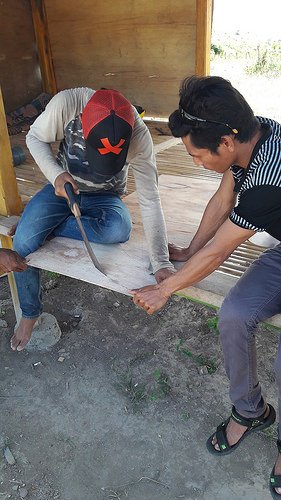
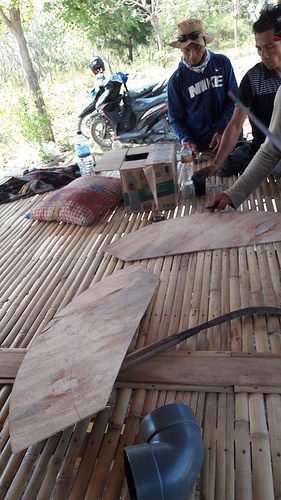
These connected and fit with 6mm plywood to for the rigid shell
Please meet our team, hard at work : Parman, Mardi, Amaq Ema, Ahyar, Zainal, Iwan, Amaq Agung and the Trainer of trainers who studied with BATI, Mr Jumahir, all from Sekaroh village.
Ahyar and Jumahir use the pattern to mark out the curve on 3cm thick x 20cm wide boards. We use the local woods that can be used for boat repair so that they are more durable and can be used many times.
Mardi and Amaq Agung skillfully carve out the curve of the formwork using the local all purpose handtool, the Parang.
Zainal continues, with Amaq agung showing the finished curve in the background
Ahyar and mardi are measuring the 2.4m 6mm plywood sheets to cut in half.
The two ends are joined to form a shell that the plywood will be fitted to
Setting up the formwork
Next it was onto setting up the formwork for the toilet building. For this we used 5 water tank mould segments to form a cylinder, and then one extra as a wing that will serve to block sight and wind and increase privacy when entering and exiting the toilet block
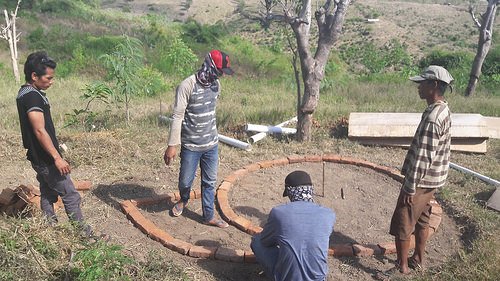
A brick foundation was set level and the foundation set up using 8mm iron rebar. If you can buy prewelded mesh in your area then this will be much easier. This gives some support to the base and though its essential for a water tank, its optional for this toilet. However, if it can be done its is better to give the construction a good foundation slab
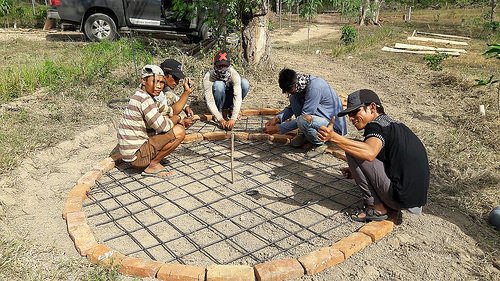
Concrete was poured at the base, with wire ties left standing upright to incorporate into the outer mesh layers
After setting concrete for about 4 hours we set up the moulds. The workspace was covered with a tarpaulin to shade and shield the mortar from excessive heat and to slow the drying process. This slower drying helps the mortar set stronger and last longer.
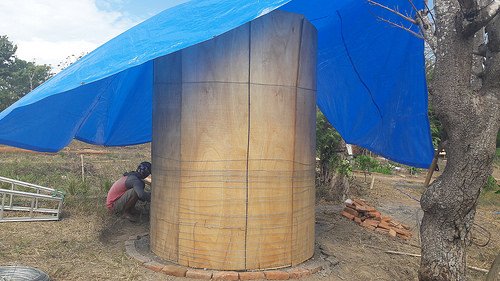
1 inch light wire mesh is attached to the outer forms and tied in place by encircling with wire in a continuous ring about 2 inches/5cm apart.
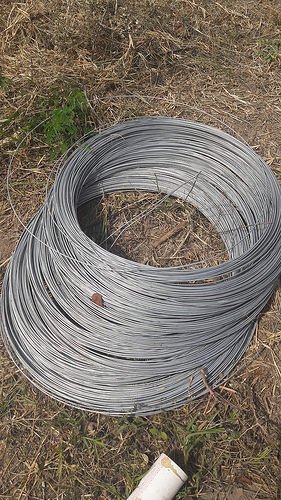
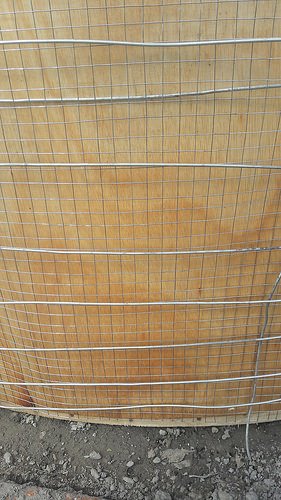
This design is a little different as we are going to make the roof using traditional Ijuk fibres. These are fibres from sustainably grown Sugar palms on Lomboks mountains, and are very long lasting
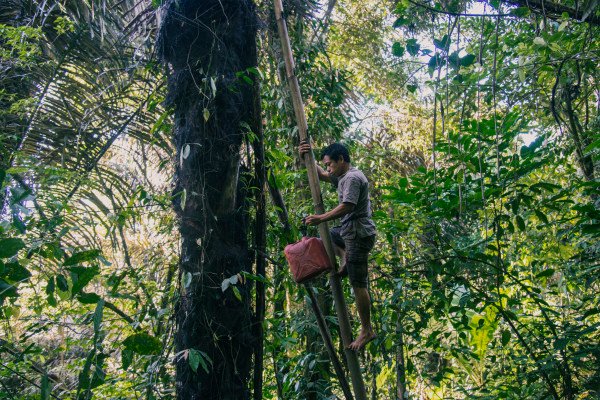
Sugar Palms yield both sweet sap to make Palm sugar and wine, but also a resilient black fibre called Ijuk, useful for thatching and string
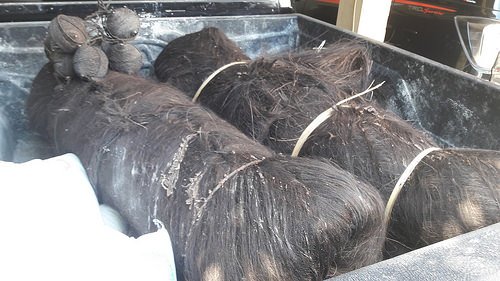
Ijuk fibres
To attach the roof we incorporated 8mm iron reinforcing bar (rebar) uprights into the foundation leaving ~ 25cm of reinforcing bar protruding above the tank rim. These will give attachment points for the Timber, bamboo and Ijuk roofing.
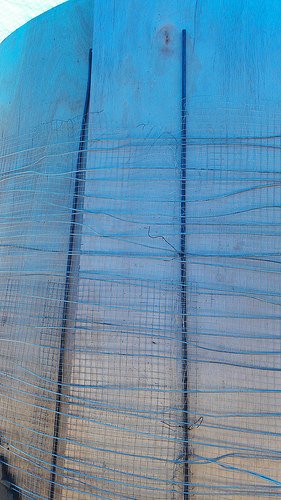
The rebar is set into the concrete base and enmeshed between layers of the wire mesh so it is thoroughly embedded in the structure
In the standard design for our water tanks we build we don’t use Rebar except in the base. Adding these in did make attaching the mesh and wire a little less flush with the formwork than usual.
And there was miscommunication about how and when to attach the Wing. I intended for the Tank form to be built first, with wire ties left protruding, however the team attached it all at once. No problem. We will see how it goes, no big problem, this is after all a prototype! Ndek Kembi Kembi!
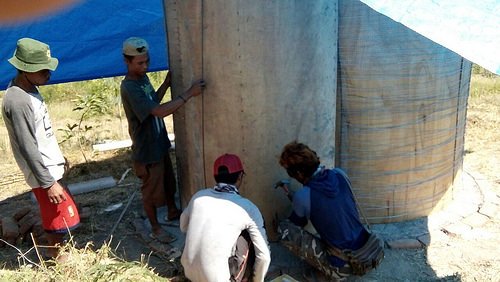
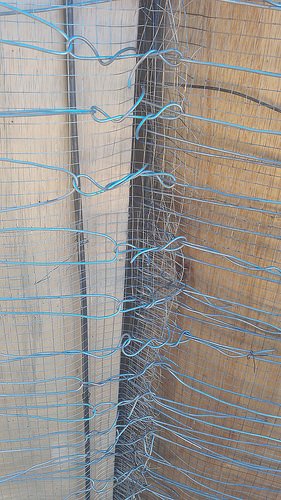
it'll be fine. Overengineered if anything and soon entombed in mortar!
Next... The build!

please Comment, Upvote, Share or Resteem!

this is awesome dude, its always there in the first world and you never really think about it, good luck with the build and more like it
Downvoting a post can decrease pending rewards and make it less visible. Common reasons:
Submit
Thanks mate @sols.
Thankyou for bringing me here. Its just the platform ive needed to activate me into tellung the world what we are doing out here in the Forgotten forest :))
Downvoting a post can decrease pending rewards and make it less visible. Common reasons:
Submit
nice post
if you guys like my post then please upvote follow resteemed
https://steemit.com/steem/@neerajsharma007/top-5-altcoin-investment-july
Downvoting a post can decrease pending rewards and make it less visible. Common reasons:
Submit